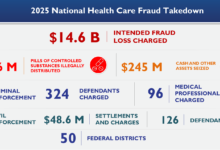‘Regional variations’ in learning disability liaison nurse coverage

New research has found regional variances and gaps in the provision of learning disability nurses in acute hospital settings, despite them having “tangible benefits” for patients.
The study, led by researchers from universities and NHS trusts in London and Lancashire, explored the role of the intellectual disability liaison nurse, also known as the learning disability liaison nurse, and its impact on patient care.
“Intellectual disability nurses represent only a small proportion of all nurses in the UK and their numbers are falling”
Researchers
Due to be published soon in the BMJ Open, the research analysed data of 4,742 people with learning disabilities who died in a hospital in England between 2016 and 2021 and whose deaths were reviewed by the Learning From Lives and Deaths Reviews (LeDeRs) programme.
Intellectual disability liaison nurses help to advocate for people with learning disabilities in hospitals, support their journey through the system and educate other staff on how to meet the needs of these patients.
Large variances in access to these specialist nurses were found by the study; only a minority (34.1%) of patients had been in contact with one.
Patients who lived in the North East, Yorkshire and North West of England were less likely to have had contact with an intellectual disability liaison nurse, compared with those in other parts of the country.
“This may be due to difficulties in recruitment or retention of specialist staff in those areas,” the report read.
“Intellectual disability nurses represent only a small proportion of all nurses in the UK and their numbers are falling.”
Variance also occurred between patients depending on why they were in hospital.
Those who died of cancer were the most likely to have input from an intellectual disability liaison nurse.
Researchers speculated that the “relatively well-resourced and structured” care pathways for cancer patients may be a reason for this.
Similarly, higher rates of contact with intellectual disability liaison nurses among those with multiple health conditions could have, the researchers said, been because of the nurses prioritising these patients when resources were stretched.
The researchers found contact with an intellectual disability liaison nurse was “not significantly associated” with higher levels of overall care quality.
However, they did conclude that the specialist nurses’ involvement was “associated with tangible benefits” for the patient.
These benefits included the provision of reasonable adjustments; the data showed those with input from a liaison nurse were almost twice as likely to receive reasonable adjustments to care.
“Our work lends support to the value of intellectual disability liaison nurses in general hospitals”
Researchers
Further, involvement of an intellectual disability liaison nurse was associated with best practice being followed for the patient, and in the dealing with the patient’s family.
LeDeR reports showed a correlation between contact with an intellectual disability liaison nurse and with Do Not Attempt Cardiopulmonary Resuscitation (DNACPR) orders being put in place.
The researchers said this could suggest that the nurse “can facilitate necessary end-of-life care discussions” with people with learning disabilities.
However, the study also showed that input from one of the nurses did not necessarily mean a higher likelihood a DNACPR would be “correctly completed or followed”.
Meanwhile, the study cited previous qualitative research, which found that liaison nurses were “highly valued and improve hospital experiences for people with intellectual disability”.
They called for further work on the post of the intellectual disability liaison nurse that went beyond the scope of their study, and suggested that a national census of these nurses would be a good next step.
“Our work lends support to the value of intellectual disability liaison nurses in general hospitals, but further research is needed to determine the most clinically effective and cost-effective models of care and to determine the impact on patient and family career experience,” they said.
The researchers were from King’s College London, Oxleas NHS Foundation Trust, London School of Hygiene & Tropical Medicine, University of Central Lancashire and South London and Maudsley NHS Foundation Trust.






